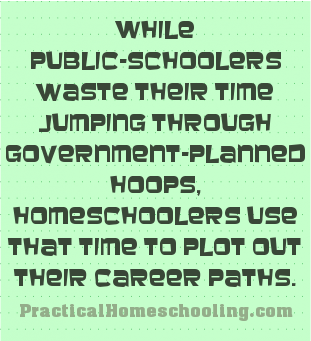 For homeschoolers, high school grades 9 through 12 represent a time of
enormous opportunity to learn and grow. Whereas public schoolers are
forced to accept all of the affective nonsense of Outcome-Based
Education and multiculturalism that masquerades as education in today’s
government high schools, homeschoolers have the opportunity to use those
four crucial years to learn what they really want to learn and what is
important to learn as they plan their own futures.
For homeschoolers, high school grades 9 through 12 represent a time of
enormous opportunity to learn and grow. Whereas public schoolers are
forced to accept all of the affective nonsense of Outcome-Based
Education and multiculturalism that masquerades as education in today’s
government high schools, homeschoolers have the opportunity to use those
four crucial years to learn what they really want to learn and what is
important to learn as they plan their own futures.
High School = Options
In those teenage years young people generally get to know what they are
interested in, what kind of careers they would like to pursue, and what
they want to do with their lives. It is also the time to prepare for
college. Thus, high school must provide exposure to a wide range of
knowledge and interests, so that the student can find out where his or
her talents and gifts lie.
Not all homeschoolers intend to go to college. For these, high school
should provide the skills and knowledge needed to succeed in the working
world. Since many homeschoolers will start businesses or services of
their own, it is obvious that they will keep on learning and gain in
experience as they advance in their endeavors. The homeschooler does not
stop learning just because he or she has reached that age beyond
compulsory school attendance. And, of course, advances in technology and
increasing costs of tuition strongly suggest that college itself may
become a practical area for home education. Indeed, CD-ROMs will make it
possible to bring the best of professors and their courses into the
homes of thousands of students.
Since high school is a time in which students can discover their true
interests, the curriculum should offer a wide range of courses. And
since we live in America, where basic principles of government and
economy determine what kind of lives we shall lead, knowledge of those
basic principles is absolutely essential if we are to defend and
maintain our unalienable rights to life, liberty, and the pursuit of
happiness.
What Do You Know?
What kind of curriculum would help us fulfill this basic American ideal
of individual freedom? We must start, of course, with what has already
been learned in grades 1–8. We assume that the basic skills of reading,
writing, spelling, grammar, arithmetic, touch-typing, and computer
technology have been mastered in varying degrees, and that such subjects
as American history, geography, science, economics, foreign language
have been studied to the extent that a 14-year-old can absorb them.
We assume that the youngster has also been engaged in a variety of
hobbies and extracurricular activities such as drawing, acting, swimming
and other sports, stamp or coin collecting, caring for pets, learning a
musical instrument, hunting and target practice, running a small
business, cooking, baking, helping parents, etc. We also assume that the
Christian homeschooler has acquired a good knowledge of the Bible and
the ability to argue against such liberal atheist doctrines as
evolution, feminism, and socialism.
Take It From There
High school simply builds on what has already been learned in the
earlier grades. It continues growth in such subjects as English,
composition, mathematics, history, geography, science, economics, and
foreign languages. It should particularly emphasize the expansion of
vocabulary and the ability to write clearly and logically. The student
must also study those subjects required for college entrance. College
catalogs generally list these requirements. Thus, before you settle on
your curriculum, you should write to the colleges and even speak to
admissions officers for their advice. Many colleges these days seek out
homeschoolers and are more than willing to help them prepare for college
entry.
There is also the matter of the Scholastic Aptitude Test (SAT) and the
ACT Assessment, either of which can be taken by college-bound students,
although some colleges no longer require taking these tests. The SAT is
divided into Verbal and Mathematical parts. The ACT includes four tests:
English, Mathematics, Reading, and Science Reasoning. If you
intends to apply for a scholarship of some kind, taking one or both
tests may be necessary.
On the next pages you will find my outline of a suggested high-school
curriculum for homeschoolers. Obviously you must tailor this curriculum
to conform with your career needs. Flexibility is the key to a good
educational program. Certain careers and professions require certain
knowledge and skills. That is why it is good for a student to know what
field he or she wants to get into. But since today’s economy no longer
offers guarantees of lifetime job security in any field, it is important
to be able to do many things, including starting your own business.
That’s the way it was in earlier days, and that’s the way it is today.